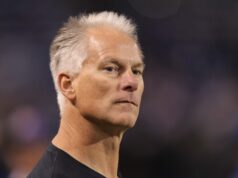Bryson DeChambeau has never been short on confidence, and on Tuesday, shared his perspective on LIV Golf. They might be taking the scenic route, but he believes it’s heading in the right direction.
“I’m really excited for the future of the game,” DeChambeau said as one of LIV’s most vocal ambassadors. “There’s a lot of positive movement going on currently.” Indeed, if you ask him, he’ll admit that the process has taken longer than anyone had hoped. But he’s not backing down from the vision.
“We’re Okay With That”

DeChambeau, now a two-time major winner and one of LIV’s biggest public faces, was open about the challenges. “We’re commercializing,” he said. “We’ve got some good partners aboard with us now.” It’s true — LIV has secured new sponsors, unveiled a full 2026 schedule, and restructured its leadership, appointing former NBA executive Scott O’Neill as CEO.
But what the league hasn’t gained? Momentum with the average golf viewer. According to Sports Business Journal, LIV’s recent broadcast on Fox Sports from Spain drew just 334,000 viewers — a far cry from the 1.6 million who tuned in for the Scottish Open the same weekend. So, yes, the commercial train is moving, but it’s still climbing a steep hill when it comes to relevance with the broader fan base.
OWGR Points Still the Elephant in the Room
The more pressing issue for LIV: world ranking points — or, more accurately, the lack of them. LIV’s initial application to the Official World Golf Ranking was denied, citing the 54-hole format and team-based scoring structure as incompatible with other sanctioned tours. Since then, some of its top names have free-fallen in the rankings. Jon Rahm, for example, now sits 72nd in the world — a shocking drop for a player still in his prime.
O’Neill recently resubmitted an application and stated confidently that LIV’s new proposal “addresses the outstanding questions” and pushes for a “more global, all-encompassing, and accurate ranking system.”
DeChambeau agrees that progress is being made but says more needs to be done. He floated possible tweaks to the league’s format, including the addition of relegation, more accessible entry points for players, and potentially aligning LIV with a larger global feeder tour — moves that could appease OWGR officials and open the door to long-overdue legitimacy.
“I would say that we’ve got some pretty good players over there,” DeChambeau said, clearly frustrated that LIV stars still don’t earn points for their performance. “They are deserving of it. They’re playing some incredible golf every week.”
A Glimmer of Unity?
In a subtle but possibly important development, DeChambeau noted that O’Neill and incoming PGA Tour CEO Scott Rolapp have a “friendly” relationship. In the ultra-fractured world of pro golf, where tension has become tradition, even that is newsworthy.
“I think there’s something that can get done in a good way for the game of golf,” he said, hinting at a possible detente between the rival leagues.
No one expects LIV and the PGA Tour to make up overnight. Still, if O’Neill and Rolapp can find even a sliver of common ground, it could open the door for deeper collaboration — and maybe even a unified ranking system that acknowledges talent regardless of the tour patch on a player’s polo.
For now, LIV’s trying to prove it can sustain, grow, and compete — both on the course and in the boardroom. DeChambeau’s staying optimistic, even if the pace is slower than expected. Because as far as he’s concerned, the destination hasn’t changed — just the route they’re taking to get there.





